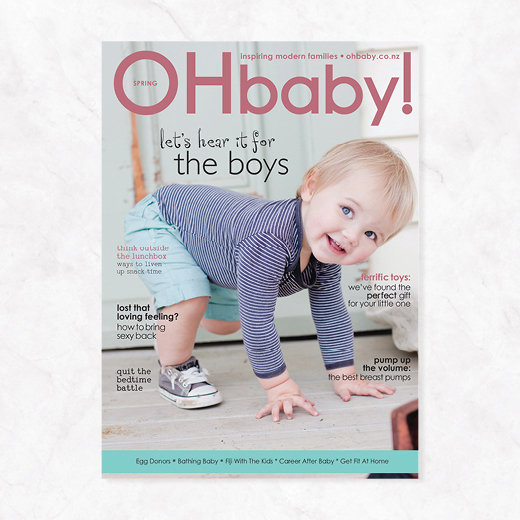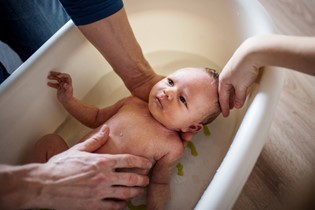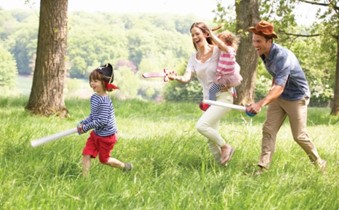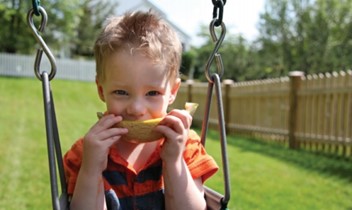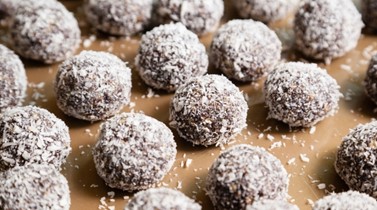Why we dig dedicated dads
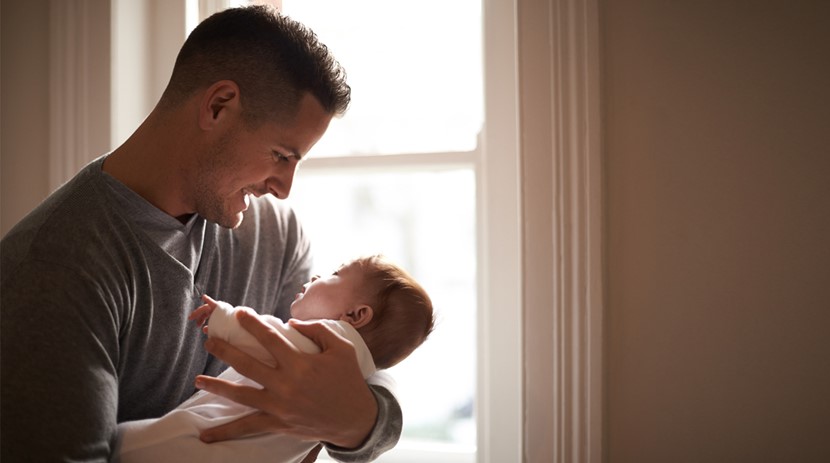
Getting fathers to bond early with baby is not just good for little one — he will take on a whole new appeal for Mum, writes Miriam McCaleb.
Why is it that I feel goopy on the inside when I hear my husband reading Mr Brown Can Moo, Can You? to our kids with gusto. What’s up with that? Have I lost my spark? Am I tedious and domesticated or what?
Biologically speaking
It turns out that this is biology at work. Research suggests that women judge men to be more attractive when they are “baby friendly”. It makes sense in evolutionary terms: We’re more likely to want to partner with someone who will help us to raise the children. A good dad is a sexy man.
This “baby friendliness” has been identified by researchers as being more important to women than perceived masculinity (testosterone levels) in choosing both short and long-term partners. If I had to choose, I’d take Anthony, the Blue Wiggle, over Arnold Schwarzenegger any day.
While acknowledging that these trends may not be true across all cultures, it does seem that a man who likes babies is hot property.
This is a tricky starting point for many people because not everybody likes babies. On the surface, babies may seem hyper-fragile, noisy and impractical. They disrupt sleep, spit up on dryclean-only clothing and steal wives’ attention.
Dave Halligan is the director of Parenting for Men, a non-profit organisation based in Tauranga. Dave knows a thing or two about fatherhood and encourages parents to take the time early, with a new arrival, noting, “Quite a few new dads need to ‘fall in love’ with their baby. They often don’t have an instant deep bond with their child in the early weeks and months.”
None of this is helped by the fact that in our modern world many of us arrive at parenthood having had minimal interaction with small people. It’s especially true for men. This point was reiterated by Dr Simon Rowley, a neonatal paediatrician at National Women’s Hospital in Auckland and trustee of the Brainwave Trust. He thinks about fatherhood both as a dad and as a professional and observes: “Throughout childhood there remains the perception that caring for a baby is women’s work. Boys are not encouraged to look after their younger siblings as much as girls are so they grow up being less familiar with what parenthood entails.”
It’s true. Young men tend not to get chosen as babysitters and, unless their extended family includes some baby cousins or nephews, it is entirely on the cards that the first infant many fathers hold is their own.
It’s a tricky starting point, as research tells us that our enjoyment of parenthood is a contributing factor in helping us find that sweet spot of “good enough” parenting. So what does a “good enough” dad look like?
As well as talking about enjoyment, the research often uses the language of “involvement”. A British mega-analysis gathered information from a ton of studies and defined “involved” as being: A dad reading stories to his child, taking him on outings, showing an interest in his education and taking a role in managing the child (although I’m unsure if that’s managing behaviour or things like “where is your jersey?”).
Time and again research points to having an “involved” dad as being positively associated with self-esteem, academic success and the decreased likelihood of delinquent behaviour.
And let’s not forget the vital importance of early relationships on the rapidly developing brains of our infants and toddlers. The lions’ share of brain architecture is laid down in those first few years, so early experiences indelibly influence intellectual abilities and behaviour throughout life. No matter which way we look at it, fathers matter. A lot. So how do we support our blokes in discovering the joys of babyhood if they’re not naturally drawn to babies?
Frankly, this is a somewhat selfish question: If this is the key to a sexy husband as much as, say, a swanky new suit, how do we help our hubbies get a cut that fits?
How nappy changes are sexy
When I talked to Nathan Mikaere-Wallis (a father of three, a trustee for the Brainwave Trust and a former university lecturer with a background in child counselling) he had many great ideas. First up, the fact that fathers who are present at the birth of their babies enjoy elevated levels of prolactin, oxytocin (“the love hormone”) and vasopressin (the “monogamy hormone”). That’s credited with creating protective feelings toward wee wifey and baby, instead of demanding he rush off and impregnate someone else.
As Nathan says, these hormonal gifts are “a crucial start to making your kids enjoyable” and Daddy doesn’t get those hormones from the waiting room.
As well, Dr Rowley brings good news: “Attending deliveries over the last 35 years I have seen a huge difference in how much more involved fathers are.”
But if you haven’t had that experience, fret not, the release of oxytocin is not limited to birthing. Fathers enjoy a boost whenever they play and interact with their children.
This idea is supported by an anecdote from Justin Wolfers, an economist at the University of Michigan. When interviewed about parenting by the team at Freakonomics, Wolfers said he initially embraced being in charge of nappy changes because his partner was CEO of breastfeeding. To put that in economic terms, “Betsy does inputs, I do outputs.”
He said he now encourages all his male friends to volunteer for the role of Changer-in-Chief, explaining: “It’s a nice time to spend with your kid. When they’re really young, it’s one of the few times they make eye contact with you.”
I’ll bet Wolfers was experiencing an oxytocin boost to further reinforce the goodness of those times.
Research also confirms that a child will be more likely to maintain a connection with his father throughout his life if he’s had lots of involvement in the early years.
And here’s the circular thing: If enjoyment makes us better parents, being better parents makes us enjoy it more. The more we are involved, the more we enjoy it and the more skilled we become.
Working overtime
So what other barriers prevent daddies’ involvement, enjoyment and rampant sexiness? And what can we do to help?
Some of the issues are massive and societal. More Kiwis are working 50-hour weeks than elsewhere in the OECD. British research says, parents would opt to spend more time caring for their kids, while other data suggests 44% of fathers want more time with their kids. Dave Halligan reinforced this point, saying “most men want less work and more family time”.
Dr Rowley says he remembers having that light-bulb moment when he was spending time at home with his firstborn while his wife was recuperating in hospital after having baby number two. He said it “made me realise how much of a barrier work is to enjoyment and involvement”.
Another layer to the work thing is what Dave identified as “the belief that ‘providing for’ means money/work, rather than providing emotional sustenance and teaching life skills”.
The wifely reaction to this conundrum might be to encourage a periodic review of the big picture — what are our roles and our expectations of each other? Is it necessary and desirable for both partners to work full-time? Is there room for taking turnabout in the full-time/part-time roles? Is there any wiggle room in the budget to enable one or both of us to reduce hours? Why not wait until the kids start school to worry about buying new carpet?
These are important conversations to have, maybe revisiting annually.
Researchers propose that the increased flexibility in modern families (versus the 1950s model of at-home mother, working father) can cause stress. We should ask ourselves, if every family can be structured uniquely, then how do we want ours to work? Is what we’re doing best for us?
And consider whether more family time could be created with a rethink of life beyond the workplace. Is too much family time being eaten up by swimming/karate/piano lessons? What if these were kept to specific days, or only in, say, alternate terms of the year? Winter or summer sport, not both? Or perhaps the challenge is to carve out whanau time during the drive to gymnastics? Tricky: unstructured time is often where the magic happens.
But friends, take heart. It’s not all bad news. The Department of Statistics report that 85% of New Zealand men declare themselves “satisfied” or “very satisfied” with their lives.
Lessons for mum
And then there’s the final barrier to paternal involvement and enjoyment and this is more personal. Even hard to take. All of my dad experts identified this and it hit a nerve. Nathan, Simon and Dave all independently suggested that mothers can be a barrier. Yup, us. Me and you. Do you recognise the mother who corrects Dad’s every attempt to engage with baby (as Dr Rowley put it: “Here give me the baby, I’ll do that, you are so hopeless”) or the disapproval of everything from the choice of footwear to the quality of lunch.
Again, Dave Halligan: “Often men feel like a golf caddy in the parenting relationship.” This is hardly a recipe for involvement and enjoyment.
So let me think this through: if I can back off and let Dad do more, he’ll have a greater enjoyment of parenting, my baby (Dave’s words) “will benefit significantly from full engagement with both parents”, I’ll get a wee bit of time to myself and my husband will seem sexier? Pass him the Dr Seuss. I’m off for a walk!
So, clearly, an involved father wins. He’s more skilled at parenting, his brain receives more hormonal benefits and his wife finds him sexier. So get in there, daddies. Get on the floor with those kids.
It may seem counter-intuitive if you’re not having fun in the role right now, but more equals better. To enjoy parenting more, do more of it.
Infancy and toddlerhood are times of unequalled potential for influencing the trajectory of a person’s life. Time with babies is time well spent.
What could daddies do to increase their enjoyment/involvement?
- Claim a care routine. Do like Justin Wolfers and be Mr Nappy Changer, or make bath time your own, sexiness quotient increasing with every infant interaction.
- Take some time to learn about the science of childhood. This can help highlight the miracles and temper the challenges of things like the realities of sleep and individual temperaments.
- Be kind to your wife/partner. If she’s being a bit intense it’s probably a reflection of how deeply she cares.
- Know that nurture builds brains and resilience. Time spent cuddling and talking to your baby is time invested wisely.
- Let’s all pledge to encourage our sons to think of themselves as nurturers. Little boys can play with dolls and blokes can babysit.
And what can mums do to support those delightful daddies in enjoying parenting? - Include Dad right from the start.
- Accept that fathers do things differently.
- Be clear with one another. My girlfriend was suffering crazily from morning sickness and was irate with her husband for not taking up the slack. He was politely clueless about her anger: “I haven’t done anything!” (“Exactly!”) Things shifted when she got really clear about how nauseous she felt and exactly what extra tasks she needed from him. Packing an older child’s lunchbox or using scented cleaning products can be gruelling for a chunderous mama. Point it out (but lovingly!). Be explicit.
- Keep breathing, smiling and laughing.
- Remember how it’s supposed to be fun?
- Practise gratitude and kindness for everything and everyone, especially for yourself.
Miriam McCaleb blogs at baby.geek.nz, parents in North Canterbury and teaches all over the place. This article has added to a greater appreciation of the daddies in her life (especially you, Mr McCaleb!).
Photography: Northfoto

AS FEATURED IN ISSUE 23 OF OHbaby! MAGAZINE. CHECK OUT OTHER ARTICLES IN THIS ISSUE BELOW
